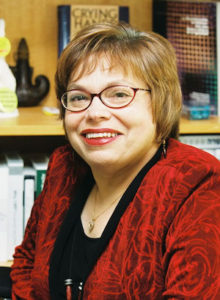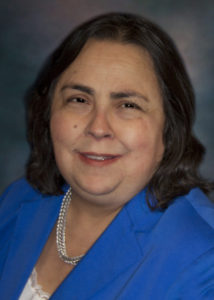As the Solutions Marketing Group team continues to celebrate Women’s History Month, we are highlighting the significant contributions of exemplary women with disabilities. Today, we honor International Disability Rights Consultant and a pioneer in the disability rights movement, Judith (Judy) Heumann.
What sparked your desire to pursue disability advocacy as a career?
 When I was growing up, I wanted to be a teacher. I wanted to be a singer. I wanted to be an actress. I did not choose to become a disability rights advocate. But there were so many barriers limiting my options, both professionally and personally. Lack of accessible transportation, lack of accessible streets, prejudiced views towards me, my friends and millions of others I didn’t know because we had a disability. It became obvious to me that in order for me to pursue my dreams, I would have to work on removing these barriers. The civil rights movement enabled me to use the word “discrimination.” I was being discriminated against because I had a disability. I also was being discriminated against because I was a woman – a woman with a disability. Once I was able to publicly speak using the term “discrimination” in violation of my civil and human rights, I became much more empowered. Working with disabled people has always been a critical part of my life. While we have different types of disabilities, we faced discrimination. I realize as progress is made to end discrimination, it enables us to exercise our human rights. As a result, we become more empowered and recognize our voices must be stronger. I have learned that I cannot be ashamed of who I am. My disability has made me a stronger person.
When I was growing up, I wanted to be a teacher. I wanted to be a singer. I wanted to be an actress. I did not choose to become a disability rights advocate. But there were so many barriers limiting my options, both professionally and personally. Lack of accessible transportation, lack of accessible streets, prejudiced views towards me, my friends and millions of others I didn’t know because we had a disability. It became obvious to me that in order for me to pursue my dreams, I would have to work on removing these barriers. The civil rights movement enabled me to use the word “discrimination.” I was being discriminated against because I had a disability. I also was being discriminated against because I was a woman – a woman with a disability. Once I was able to publicly speak using the term “discrimination” in violation of my civil and human rights, I became much more empowered. Working with disabled people has always been a critical part of my life. While we have different types of disabilities, we faced discrimination. I realize as progress is made to end discrimination, it enables us to exercise our human rights. As a result, we become more empowered and recognize our voices must be stronger. I have learned that I cannot be ashamed of who I am. My disability has made me a stronger person.
What is your educational background?
I was denied the right to go to school until I was 9 years old. When I started going to school in the 4th grade, I was in a class only for disabled children that was racially integrated. I was the first student from my special education class to graduate and go to high school. Before that, students in my special education class stayed in the school until they were 21 and then went to segregated sheltered workshops. I went to a high school in Brooklyn, but couldn’t go to my neighborhood school since it wasn’t accessible. From elementary through high school, my daily commute was two to three hours. This was so long because we had to pick up other disabled students. Those long rides were a great opportunity for me to talk with my friends who had disabilities.
After high school, I went to Long Island University in Brooklyn, New York and majored in both speech and theater; and minored in education. I studied to be a speech therapist, but had a passion to be a teacher. I shifted my focus and began taking classes to prepare me for the classroom. At that time, there were no teachers who used wheelchairs in the New York City public school system. After suing the New York Board of Education because they considered my use of a wheelchair to be a fire hazard, I won the case, obtained my teaching credential and taught for 3 years, This made me the first wheelchair user to teach in the state of New York. I then decided to move across country to get my Masters in public health at University of California, Berkeley.
What is your specialty?
Advocacy, community organizing and public policy.
What was your first job?
I had many small jobs while in college. My first job was working at Camp Jened as an intern in upstate New York. This was a camp for disabled youth and I had been a camper there for years. I also worked at Long Island University as a college work-study student in the president’s office. While in college, I had a summer internship working as a social worker at a community senior center in Brooklyn.
What was your favorite job?
I don’t have one job that was my favorite job. I have been very fortunate to learn from every position I’ve had. After suing and getting my teaching license, I was fortunate to teach disabled students for three years. The segregated environment I worked in was not ideal for me, or the students. But it gave me an opportunity to encourage the disabled students to dream their real dreams and to think about careers that they were interested in rather than what people told them they should do.
I also had an unpaid position as the President of Disabled in Action, in New York. This gave me and my friends the tools and experience we needed to advance the rights of people with disabilities.
I also served at the Berkeley Center for Independent Living (CIL), as the Deputy Director. That was a phenomenal job! As the first Center for Independent Living in the United States, we were able to do work I never dreamed possible. I worked alongside non-disabled and disabled people to fight for equality. I learned how to organize to get city, county, and state government to be more responsive to the needs of disabled people, which was a phenomenal experience. The Section 504 demonstrations were just one part of the work we were able to do and worked in collaboration with other disability rights organizations. We also worked with organizations from the labor movement, women’s movement, the interfaith community and every day citizens who cared about equality and drove that message in all of our work. Working at CIL was like being in a candy store.
I was a co-founder of the World Institute on Disability and worked collaboratively with Ed Roberts and Joan Leon. This was the public policy organization run by people with disabilities. This was a difficult but wonderful job because we created an organization from its infancy. We demonstrated that the voices of disabled people were critical in the areas of public policy and research.
My job as the Assistant Secretary for the Office of Special Education and Rehabilitative Services was an honor I never thought I would have. Working in the Clinton Administration was difficult, but very rewarding. We pushed an agenda of inclusion, which brought voices of disabled people and parents to the table. We also hired disabled people in senior positions and worked to integrate disability across the Department of Education. We collaborated with agencies across the government to advance disability rights, which resulted in a progressive legislative agenda. This provided students with an opportunity for greater inclusion, not only in the classroom, but also placed focus on acknowledging that employment was a critical outcome of education. Supporting and strengthening Centers for Independent Living was also an important part of our agenda.
I also worked at the World Bank, as their first Advisor on disability. This position had some unique challenges. While the President of the World Bank was supportive of inclusion, many others did not see its value, which presented barriers. But, I am very proud of the work that we did to advance disability inclusion within the World Bank’s agenda.
As the Director of the Department on Disability Services for the District of Columbia, I had the privilege of improving services for disabled people, but also providing them with a voice and seat at the table. I learned, first-hand, about the challenges the District faced and how we could make a difference.
Finally, I served as an Obama Appointee and was the first Special Advisor for International Disability Rights at the State Department. I had a small, dedicated team, and together we advanced disability inclusion in U.S. foreign policy and diplomatic work. This job enabled me to take what I learned over 40 years and share that knowledge to advance the human rights of disabled people around the world. I traveled to many countries, worked with our embassies, held meetings with international disability rights organizations, and governments to develop a message of disability inclusion throughout the world. My role was to represent the U.S. government and President Obama to express our views, and shed light on removing discriminatory policies and practices which limit opportunities for disabled people around the world. I often shared the progress we’ve made, and where we still need to do more work within the United States. I always emphasized the importance having diverse voices of disabled people at the table.
What piece of advice do you have for women with disabilities?
Dream big, work hard, work in collaboration with others, feel proud of who you are and never take “no” as an answer.
What do you want your legacy to be?
I believe in justice and equality for ALL. JUSTICE and EQUALITY doesn’t come easy. We need to respect each other and fight together for change – here and around the world.
How can we find you on social media?
Facebook: https://www.facebook.com/judith.heumann
Twitter: @judithheumann
 What sparked your desire to pursue disability advocacy as a career?
What sparked your desire to pursue disability advocacy as a career?